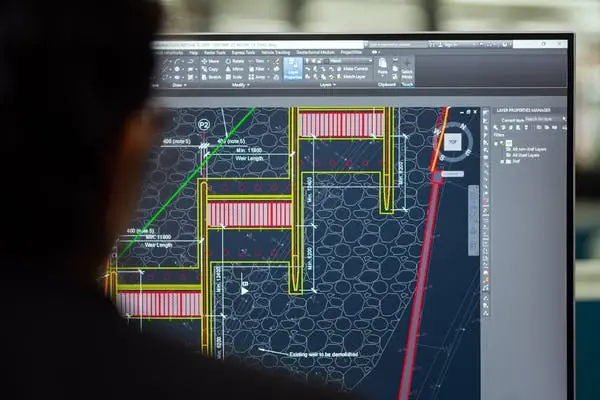We used the latest data and insights to identify the highest paying mechanical engineering jobs so that you can learn and earn more.
Have you ever wondered what the highest-paying mechanical engineering jobs are? Well, you’re in luck! It’s time to find out.
This article will give a quick rundown of the top-paying jobs in mechanical engineering. From automation engineers to powertrain engineers, these are the jobs that pay well.
We sourced the information from the US Bureau of Labor Statistics, Glassdoor, and Payscale. We also included information about the mechanical engineering salaries, education, skillset, and responsibilities associated with each position.
Here are the highest-paying jobs in the mechanical engineering industry:
You Might Also Want To Know:
- 10 Highest Paying Communications Jobs
- 10 Highest Paying Hospitality Jobs
- 10 Highest Paying Interior Design Jobs
Table of Contents
#10. Design Engineer
How much do they get paid?
- Source: Payscale
- Low Range: $54,000 per year
- High Range: $102,000 per year
- Median Pay: $70,200 per year

What do they do?
A design engineer is responsible for creating, designing, and developing products. These engineers work with other departments to ensure that the final product meets company standards and customer expectations.
What degrees and skills are usually required?
To become a design engineer, you typically need a bachelor’s degree in engineering. Mechanical and electrical engineering are the most common fields of study. You should also have strong computer skills and an understanding of CAD software (computer-aided design).
Who’s hiring for this job?
Design engineers are in demand in a variety of industries, including manufacturing, aerospace and defense, automotive, and medical devices.
What is the best way to get this job?
The best way to get a job as a design engineer is through networking. Talk to people in the field and get advice on how to break into the industry. You can also consider applying for entry-level positions in this field. This will help you gain the skills and experience necessary for this job.
Should you become a design engineer?
#9. Processing Engineer
How much do they get paid?
- Source: Payscale
- Low Range: $59,000 per year
- High Range: $105,000 per year
- Median Pay: $76,307 per year

What do they do?
Processing engineers work in the field of manufacturing. They design and improve manufacturing processes, from raw materials all the way through to finished products. These professionals may inspect equipment or test the finished product to ensure it meets specifications.
What degrees and skills are usually required?
Processing engineers typically have a bachelor’s degree. Many get their degrees in mechanical, chemical, or industrial engineering. Some employers also require their candidates to have experience working as an engineer in the field of manufacturing.
Who’s hiring for this job?
Employers include manufacturers, research companies, and government agencies. These professionals may also work in aerospace, automotive parts manufacturing, chemical processing plants, and pharmaceuticals.
What is the best way to get this job?
After getting your degree, it’s a good idea to get some experience under your belt by working as an engineer. This will help you build up your resume and make connections with potential employers. What does it take to be an engineer? Here are some qualities you should have:
- Strong problem-solving and analytical skills
- An ability to think creatively and strategically
- An eye for detail
What’s it like to be a processing engineer?
You Might Also Want To Know:
- 10 Highest Paying Management Information Systems Jobs to Consider
- 10 Highest Paying Legal Jobs to Consider
- 10 Highest Paying Industrial Engineering Jobs to Consider
#8. Powertrain Engineer
How much do they get paid?
- Source: ZipRecruiter
- Low Range: $51,000 per year
- High Range: $117,000 per year
- Median Pay: $82,724 per year

What do they do?
Powertrain engineers are responsible for designing and developing engines, transmissions, exhaust systems, and other parts of a vehicle. They work closely with other engineers to develop new technologies that improve fuel efficiency and performance.
Powertrain engineers may also test new vehicles and components before they go into production.
What degrees and skills are usually required?
Powertrain engineers typically have a bachelor’s degree in mechanical engineering or automotive technology. Employers may also prefer candidates with experience in the auto industry.
Who’s hiring for this job?
The auto industry is one of the largest employers in the world. Major automakers such as Ford, Volkswagen, and General Motors are always on the lookout for powertrain engineers.
These employers pay mechanical engineers according to their skillset and experience.
What is the best way to get this job?
You can start your mechanical engineering career by earning a bachelor’s degree in mechanical engineering or automotive technology. Then gain experience working in the auto industry by working as an intern at an auto manufacturer or dealership.
While most graduates start as junior employees, this field offers an opportunity for advancement. With experience, you can move up the career ladder to the senior mechanical engineer position.
What’s it like to be a powertrain engineer?
#7. Biomechanical Engineer
How much do they get paid?
- Source: Glassdoor
- Low Range: $58,000 per year
- High Range: $123,000 per year
- Median Pay: $84,096 per year

What do they do?
Biomechanical engineers design and test medical devices such as artificial limbs, joint implants, and medical prosthetics. They also use their knowledge of human anatomy to improve safety in vehicles and equipment used by athletes.
What degrees and skills are usually required?
Mechanical engineers working in this field typically have a bachelor’s degree in biomechanical engineering, mechanical engineering, or bioengineering.
Who’s hiring for this job?
Biomedical companies, such as orthopedic companies, hire biomechanical engineers. You can also find jobs at universities or hospitals that are developing medical devices.
What is the best way to get this job?
The best way to get a job as a biomechanical engineer is to earn a degree in one of the related fields. After earning your degree, you can look for jobs at companies that develop medical devices or sports equipment.
Should you become a biomechanical engineer?
You Might Also Want To Know:
- 10 Highest Paying Law Enforcement Jobs to Consider
- 10 Highest Paying Web Design Jobs to Consider
- 10 Highest Paying Pharmacist Jobs
#6. Instrumentation Engineer
How much do they get paid?
- Source: Payscale
- Low Range: $61,000 per year
- High Range: $135,000 per year
- Median Pay: $89,310 per year

What do they do?
An instrumentation engineer is a technical professional who works with the instruments used in scientific and industrial settings. They are responsible for installing, maintaining, repairing, and calibrating these instruments.
An instrumentation engineer might work with industrial process control equipment, medical monitoring devices, or scientific analytical equipment.
What degrees and skills are usually required?
Instrumentation engineers must have at least a bachelor’s degree in engineering, either mechanical or electrical. They may also choose to pursue a master’s degree in instrumentation engineering or another related field.
Who’s hiring for this job?
Instrumentation engineers are in high demand. They have a wide range of career opportunities, from working for small companies to large corporations and government agencies. Some common employers for instrumentation engineers include:
- Manufacturing companies
- Power plants
- Research facilities such as universities, pharmaceutical companies, and laboratories
What is the best way to get this job?
Instrumentation engineering is a highly specialized field, so it’s important to get the right education. You can earn an associate’s or bachelor’s degree from a technical school, community college, or four-year university.
You can also earn a graduate degree in instrumentation engineering at the master’s level. This will give you additional skills and knowledge needed for your career.
Once you have the right education, you can start looking for an instrumentation engineering job. You may be able to find one at a company that manufactures or services industrial equipment.
Should you become an instrumentation engineer?
#5. Mechatronics Engineer
How much do they get paid?
- Source: Glassdoor
- Low Range: $58,000 per year
- High Range: $140,000 per year
- Median Pay: $89,317 per year

What do they do?
A mechatronics engineer is someone who works on engineering systems that combine mechanical components with electronic and software components.
These engineers use the principles of electrical engineering, computer science, and mechanical engineering to design systems that can sense and respond to their environment.
Some common applications for this type of technology include robotics, medical devices like artificial hearts, and automobiles.
What degrees and skills are usually required?
According to Zippia, 77% of these mechanical engineers have a bachelor’s degree. The field of mechatronics is still relatively new, so there isn’t a standard curriculum that all schools use yet.
However, most programs will cover topics in electrical engineering, computer science, and mechanical engineering. Some schools also offer advanced degrees in this field as well.
Who’s hiring for this job?
There are many types of organizations that hire mechanical engineers. These include manufacturing companies, government agencies, and companies that design products for consumers.
What is the best way to get this job?
The best way to get a job as a mechatronics engineer is to earn an accredited degree in the field. You should gain experience through internships. You may also work part-time at a company that has similar projects.
Once you have the degree, you can apply for jobs at companies. You could also look for opportunities with government agencies that work with robotics and automation.
What’s it like to be a mechatronics engineer?
You Might Also Want To Know:
- 10 Highest Paying Jobs for Economics Majors
- 15 Highest Paying Biology Jobs
- 15 Highest Paying English Jobs
#4. Opto Mechanical Engineer
How much do they get paid?
- Source: Glassdoor
- Low Range: $67,000 per year
- High Range: $139,000 per year
- Median Pay: $95,654 per year

What do they do?
Opto mechanical engineers design and develop mechanical systems that use light to transmit data. They work on everything from digital cameras to fiber optic cables. These engineering professionals also work on medical devices, lasers, and semiconductor chips.
What degrees and skills are usually required?
Opto mechanical engineers typically need a bachelor’s degree in mechanical engineering, though some opt to earn a master’s degree. They also need knowledge of optics and electronics.
Most employers require opto mechanical engineers to have a minimum of two years of experience.
Who’s hiring for this job?
Employers of opto mechanical engineers include technology companies and engineering firms. Many opto mechanical engineers work in large cities that are hubs for technology.
What is the best way to get this job?
There are a few ways to get into opto mechanical engineering. The most common way is through an undergraduate degree program in mechanical engineering. Some opto mechanical engineers earn a master’s degree instead, which can help them stand out from other candidates.
Once you have your degree, find an internship or entry-level position with a company that will give you valuable hands-on experience.
Should you become an opto mechanical engineer?
#3. Automation Engineer
How much do they get paid?
- Source: Glassdoor
- Low Range: $65,000 per year
- High Range: $150,000 per year
- Median Pay: $98,429 per year

What do they do?
Automation engineers design and develop automated systems that can be used in a variety of industries. They work on jobs such as creating robots or designing machines that can perform specific processes.
What degrees and skills are usually required?
Automation engineers must have a bachelor’s degree in computer science, mechanical engineering, electrical engineering, or another related field. Most employers prefer applicants with at least two years of experience working in the field before applying for this job.
Who’s hiring for this job?
Automation engineers are in demand in a variety of industries. Companies such as Amazon, Google, Facebook, and Microsoft all hire automation engineers. These professionals also work at companies that manufacture robots and other automated equipment.
What is the best way to get this job?
You can find a job by searching for openings on sites like Monster and LinkedIn. You may also network with other automation engineers to learn about new opportunities that are available.
How do you become an automation engineer?
You Might Also Want To Know:
- 10 Highest Paying Jobs for Economics Majors
- 15 Highest Paying Biology Jobs
- 15 Highest Paying English Jobs
#2. Research and Development Engineers
How much do they get paid?
- Source: Glassdoor
- Low Range: $73,000 per year
- High Range: $172,000 per year
- Median Pay: $111,356 per year

What do they do?
If you love to solve problems and get your hands dirty, then a career as a research and development engineer may be right for you. R&D engineers develop new products or improve existing ones. They work in laboratories or manufacturing facilities.
Their duties include:
- Testing materials,
- Developing prototypes and tools,
- Conducting experiments,
- Analyzing data,
- Reporting their findings to management,
- Collaborating with other team members, and more.
What degrees and skills are usually required?
R&D engineers typically need a bachelor’s degree in chemical, mechanical, or electrical engineering. Some employers may require applicants to have an advanced degree or certification.
In addition, R&D engineers must be able to solve problems using mechanical engineering skills.
Who’s hiring for this job?
Most large companies need R&D engineers to develop new products. These positions are often available at technology companies, pharmaceutical firms, and research institutions. Many startups also hire R&D engineers to work on innovative projects.
What is the best way to get this job?
There are many ways to get a job as an R&D engineer. You can start by searching for open positions on Monster, Indeed, and LinkedIn websites. Then, you can apply for jobs that interest you.
As part of your application, be sure to include examples of your work experience and academic achievements.
Should you become a research and development engineer?
#1. Corrosion Engineer
How much do they get paid?
- Source: ZipRecruiter
- Low Range: $62,000 per year
- High Range: $232,500 per year
- Median Pay: $140,555 per year

What do they do?
Corrosion engineers are responsible for preventing the corrosion of metals and other materials. They help companies design products that will not corrode in their environments.
What degrees and skills are usually required?
Corrosion engineers typically need a bachelor’s degree in chemistry, materials science, or mechanical engineering.
Who’s hiring for this job?
These engineers can find jobs with manufacturers that make metal products and equipment used in construction and manufacturing facilities. They can also work for government agencies that regulate the use of chemicals and other substances that can damage metals.
What is the best way to get this job?
The first step to getting a corrosion engineering job is to get a bachelor’s degree in a related field. After graduating, you can gain experience by working in the field. With experience and a good reputation, you should be able to find work as a corrosion engineer.
What’s it like to be a corrosion engineer?
You Might Also Want To Know:
- 10 Highest Paying Business Jobs You Might Not Know
- 10 Highest Paying Liberal Arts Jobs You Might Not Know
- 10 Highest Paying Chemistry Jobs to Consider
Conclusion
Mechanical engineering is a field with lots of options. It’s a great choice for anyone who likes to think and build things, but it also requires hard work and dedication. You’ll also need a professional engineer license to work in this field.
If you’re interested in pursuing this career path, just remember that it will take time—so start early.
We hope this guide has helped you understand the basics of mechanical engineering and how to get a job in this field. If you have any additional questions or comments, feel free to leave them below.


